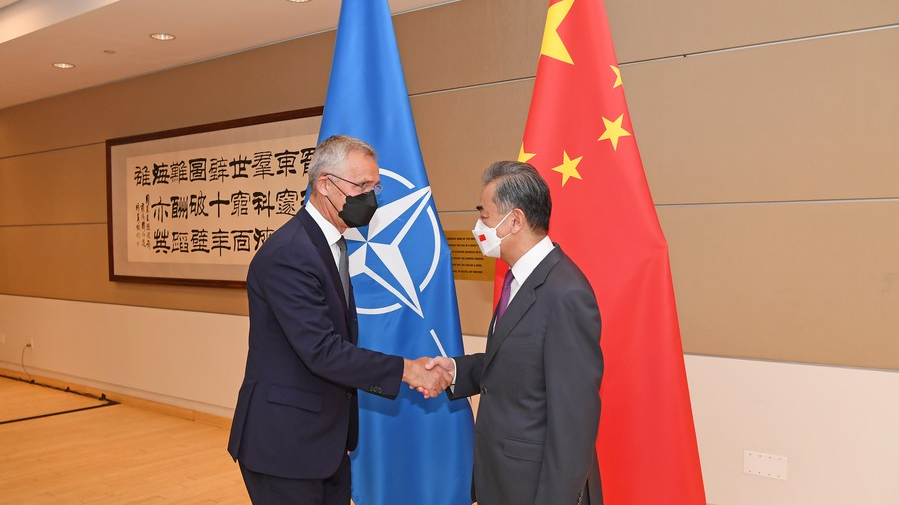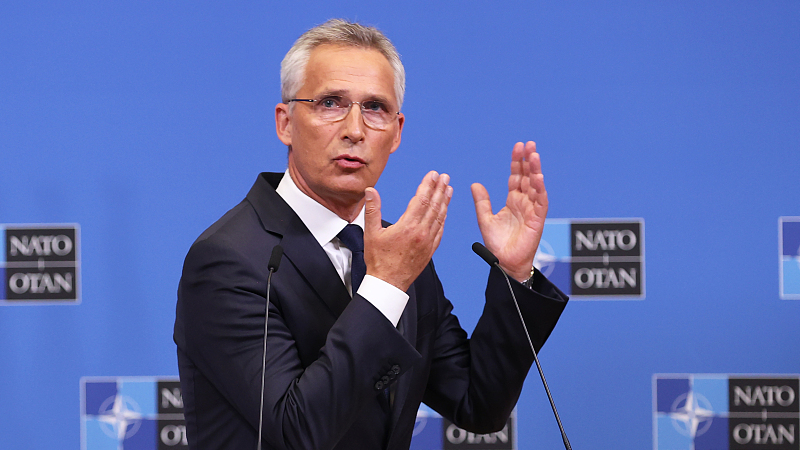
Chinese State Councilor and Foreign Minister Wang Yi (R) meets with NATO Secretary General Jens Stoltenberg on the sidelines of the 77th session of the UN General Assembly in New York, the United States, September 22, 2022. /Xinhua
Chinese State Councilor and Foreign Minister Wang Yi (R) meets with NATO Secretary General Jens Stoltenberg on the sidelines of the 77th session of the UN General Assembly in New York, the United States, September 22, 2022. /Xinhua
Editor's note: Hannan Hussain is a foreign affairs commentator and author. He is a Fulbright recipient at the University of Maryland and a former assistant researcher at the Islamabad Policy Research Institute. The article reflects the author's opinions and not necessarily the views of CGTN.
On September 22, NATO Secretary General Jens Stoltenberg met with Chinese State Councilor and Foreign Minister Wang Yi on the sidelines of the 77th session of the UN General Assembly. The exchange illustrated Beijing's commitment to steady bilateral relations and all-round dialogue on the world stage, from the U.S. to NATO. "As a permanent member of the (UN) Security Council, China is open to conducting dialogue and exchanges with NATO, and is willing to jointly promote the healthy and stable development of bilateral relations," said Wang.
Beijing's suggestion that NATO should correct its perception of China remains central to consolidating support on some pressing security issues. It can expand common-ground to the benefit of a world in flux. But essential to these pursuits is a fundamental realization: That diplomacy isn't a one-way street. The U.S. and NATO should come through on reciprocal intent.
Presently, the international security and governance landscape is all but stable. Escalating challenges demand proactive leadership, and China has communicated essential wisdom to both the U.S. and NATO by cautioning against "political correctness." A shift from it is all the more important, given that the latter has signaled some degree of convergence with Beijing on areas of global concern. That includes NATO's attention to the Ukraine conflict, which has been sustained on the back of the alliance's continuous eastward expansion and more militarization. It helps to recognize that such preferences for confrontation have not brought the world any closer to peace. Similarly, on a bilateral level, zero-sum mindsets can easily frustrate the prospect of constructive engagement with China on a host of issues.
To that end, Beijing's stated commitment to respecting the "overeignty and territorial integrity of all countries" – including Ukraine – provides a concrete opening for conflict resolution to NATO, and reaffirms the fundamentals of mutual respect to any enduring cooperation with the U.S. Washington would be ill-advised to overstretch the concept of national security and continue misleading its China policy, as this is a recipe for "conflict and confrontation" that all but fails the expectations of the global community.

NATO Secretary General Jens Stoltenberg and US Secretary of State Antony Blinken hold a joint press conference after their meeting in Brussels, Belgium, September 9, 2022. /CFP
NATO Secretary General Jens Stoltenberg and US Secretary of State Antony Blinken hold a joint press conference after their meeting in Brussels, Belgium, September 9, 2022. /CFP
For NATO, it is a welcome expectation to explore cooperation with Beijing in the spheres such as arms control and climate change to "better cope" with global challenges. China's appetite for cooperation remains undiminished, but NATO's characterization of China as a challenge to its so-called interests, security and values has done little good in practice. Contrary to the largely positive overtones of the Wang-Stoltenberg exchange, NATO's controversial stance on China "has hampered much-needed cooperation against false information," increased global uncertainties in a militarized world, and prevented NATO from establishing what Beijing sees as a "rational and correct understanding of China."
The resulting misunderstandings risk undermining the "necessary cooperation" between China and NATO on issues concerning peace and stability on the world stage. After all, it is Stoltenberg's suggestion that NATO attaches ample significance to strengthening its contact with China. That position makes for good optics, but it can attract much-needed credibility if the alliance's own Strategic Concept and security propositions reflect that view in practice.
At the same time, China's record on world peace reflects all-round cooperation capacity. For instance, in his speech at the Asia Society headquarters in New York, Wang reiterated Beijing's successes in never provoking a conflict, occupying a single inch of foreign soil, or initiating a proxy war. Similarly, NATO stands reminded of the fact that China hasn't once sought a sphere of influence, greenlit participation in military groups, or interfered in countries' internal matters.
All this is a marked departure from the alliance's own preoccupations, but NATO's genuine recognition of China's peaceful contributions is central to doing away with one-sided, rivalrous tendencies. A step in that direction is needed to promote what Stoltenberg saw as NATO's "positive attitude" towards developing relations with Beijing. "China is willing to carry out necessary cooperation with NATO on global issues and contribute to peace and stability," affirmed Wang.
By virtue of a deeply internationalized world, enduring bilateral cooperation – whether between China and the U.S. or China and the NATO – requires accurate choices that are reflective of global interests and fundamental respect. The alternative is to afford enormous uncertainty to key relationships, including consequential U.S.-China ties, when the world deserves far better.
(If you want to contribute and have specific expertise, please contact us at opinions@cgtn.com. Follow @thouse_opinions on Twitter to discover the latest commentaries on CGTN Opinion Section.)

